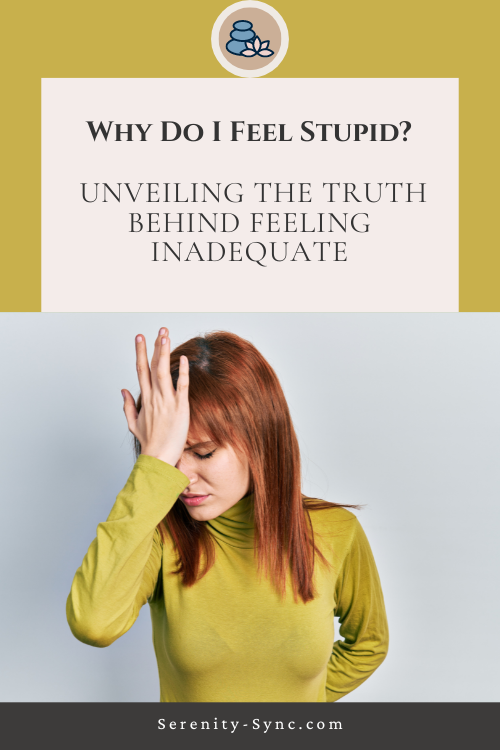In Brief
Did you ever wondered Why Do I Feel Stupid? Feeling stupid is a common experience influenced by anxiety, stress, and low self-esteem. This blog post explores the root causes of feeling inadequate and provides effective coping strategies for mental well-being.
Introduction
Feeling stupid is a universal human emotion that can stem from various factors such as anxiety, stress, and low self-esteem. This post aims to shed light on the complexities of this feeling and offer insights on overcoming it effectively. Additionally, we will discuss the importance of acknowledging and addressing these emotions for personal growth and mental wellness.
Fun Fact
The fear of feeling stupid is called “apeirophobia.” It’s the anxiety-inducing worry of not knowing enough or making a fool of oneself in social situations.
Cognitive Dissonance
Cognitive dissonance refers to the mental discomfort experienced when holding contradictory beliefs or attitudes. This internal conflict can have a significant impact on mental health, leading to feelings of inadequacy and self-doubt. Understanding and addressing cognitive dissonance is crucial for promoting emotional well-being and self-acceptance.
Causes of Feeling Stupid
Anxiety: A Common Culprit
Anxiety is a prevalent cause of feeling stupid, often manifesting as irrational fears and self-doubt. Individuals experiencing anxiety may struggle with decision-making and cognitive performance, leading to a sense of inadequacy. Recognizing and addressing anxiety through therapy and relaxation techniques is essential for overcoming this barrier to self-confidence.
Stress: The Silent Contributor
Stress can silently contribute to feelings of stupidity by overwhelming individuals with pressure and uncertainty. Chronic stress can impair cognitive function and decision-making abilities, exacerbating self-doubt and insecurity. Developing effective stress management strategies and prioritizing self-care are key steps in combating the negative impact of stress on mental well-being.
Low Self-Esteem: A Major Influence
Low self-esteem plays a significant role in fostering feelings of inadequacy and stupidity. Negative self-perceptions and a lack of self-worth can hinder personal growth and confidence, perpetuating a cycle of self-doubt. Engaging in self-esteem building exercises and practicing self-compassion are essential for cultivating a positive self-image and overcoming feelings of stupidity.
Medical Conditions: Unveiling Hidden Factors
Underlying medical conditions, such as depression or attention disorders, can contribute to feelings of stupidity and cognitive difficulties. It is crucial to seek professional help and undergo medical evaluations to uncover any hidden factors impacting mental well-being. Addressing medical conditions through therapeutic interventions and counseling can significantly improve cognitive function and emotional resilience.
Dealing with Feeling Stupid
Identifying the Root Cause
Identifying the underlying causes of feeling stupid is the first step towards overcoming this emotional barrier. Self-reflection, therapy, and seeking guidance from mental health professionals can help individuals pinpoint the root cause of their insecurities and self-doubt.
Seeking Professional Help and Support
Seeking professional help through mental health counseling and therapy can provide individuals with the tools and strategies to address feelings of inadequacy. Cognitive behavioral therapy, emotional intelligence development, and psychosomatic disorder treatments can assist in building emotional resilience and promoting self-acceptance.
Implementing Healthy Coping Strategies
Implementing healthy coping strategies, such as mindfulness practices, stress management techniques, and positive psychology interventions, can aid in managing feelings of stupidity effectively. Developing a growth mindset, practicing self-compassion, and engaging in wellness promotion activities are essential for fostering emotional well-being and overcoming self-doubt.
Overcoming Self-Criticism
Challenging Negative Thoughts
Negative thoughts can be overwhelming and detrimental to our mental well-being. By challenging these thoughts, we can regain control over our minds. Cognitive Behavioral Therapy (CBT) is a proven technique that helps individuals identify and reframe negative thought patterns. By recognizing these thoughts as irrational or unfounded, individuals can begin to replace them with more positive and realistic perspectives.
Recognizing Strengths and Weaknesses
Self-awareness is key to understanding our strengths and weaknesses. Acknowledging areas where we excel and areas where we struggle allows us to set realistic goals and expectations for ourselves. It’s important to embrace our imperfections and view them as opportunities for growth rather than shortcomings.
Seeking Help When Needed
It’s essential to recognize when we need assistance in overcoming self-criticism. Mental health counseling provides a safe space to explore our inner thoughts and feelings with the guidance of a professional. Seeking help is a sign of strength and self-awareness, demonstrating a commitment to personal growth and well-being.
Reframing Mistakes as Learning Opportunities
Mistakes are inevitable, but how we perceive them can greatly impact our self-criticism. By reframing mistakes as valuable learning opportunities, we shift our mindset from self-blame to self-improvement. Embracing a growth mindset allows us to approach challenges with resilience and determination.
Personal Growth and Emotional Intelligence
Embracing Self-Awareness
Self-awareness is the foundation of personal growth and emotional intelligence. It involves recognizing our emotions, thoughts, and behaviors without judgment. Self-reflection allows us to gain insight into our motivations and triggers, empowering us to make conscious choices that align with our values and goals.
Nurturing Self-Acceptance
Self-acceptance is a journey of embracing our true selves, including both strengths and vulnerabilities. By practicing self-compassion and forgiveness, we cultivate a positive self-image and inner peace. Accepting ourselves unconditionally enables us to navigate life’s challenges with resilience and authenticity.
Developing Coping Strategies for Everyday Challenges
Coping mechanisms are essential tools for managing stress and adversity. By developing healthy coping strategies, such as mindfulness practices and stress management techniques, we can effectively navigate life’s ups and downs. Building emotional resilience equips us to face challenges with grace and adaptability.
Conclusion
As we journey through the realms of personal growth and emotional intelligence, it becomes evident that mental well-being is paramount to living a fulfilling life. By prioritizing self-improvement and growth, we pave the way for a brighter and more resilient future. Let us continue to embrace the power of self-reflection, self-acceptance, and positive psychology in our quest for emotional intelligence and well-being.
Fun Fact
Feeling dumb can sometimes lead to creative breakthroughs. Many famous inventors and artists have reported feeling inadequate before coming up with groundbreaking ideas.

